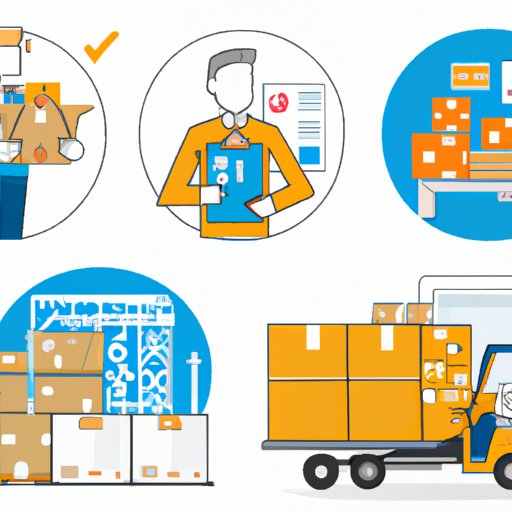Introduction
As a consumer, you interact with retailers on a daily basis. However, have you ever wondered where these retailers get their products from? This is where wholesalers come in. In this article, we will explore the role of wholesalers in supply chain management, and how they connect manufacturers and retailers. We will also examine the benefits of using a wholesaler for small business owners, and the challenges they face in a constantly evolving industry.
What is a Wholesaler?
A wholesaler is a business entity that purchases goods in large quantities from manufacturers and sells them to retailers. One of the key differences between a wholesaler and a retailer is that a wholesaler does not sell products directly to the end customer. Instead, they focus on distributing products to retailers who then sell to consumers. Another key difference between a wholesaler and a manufacturer is that a wholesaler does not produce the goods themselves, but rather purchases them from manufacturers for resale.
The primary function of a wholesaler is to purchase products from manufacturers in large quantities at a discounted price and then sell them to retailers at a markup price. This allows retailers to purchase products at a lower cost than they would if they were to purchase them directly from the manufacturer. This benefits manufacturers as well, as it provides them with a large customer base of retailers who can distribute their products to a wider market.
There are different types of wholesalers, including merchant wholesalers, agents and brokers, and manufacturers’ sales branches. Merchant wholesalers are independent businesses that purchase and sell products to retailers. Agents and brokers, on the other hand, act as intermediaries between buyers and sellers, often taking a commission for their services. Manufacturers’ sales branches are owned by the manufacturers themselves and focus on selling their products to retailers.

How Wholesalers Connect Manufacturers and Retailers
Wholesalers play a critical role in the supply chain management process. They help manufacturers reach retailers and customers in different geographical locations and offer a wide range of services to coordinate product distribution. This includes services such as warehousing, logistics, and inventory management.
One of the primary benefits of using a wholesaler for manufacturers is that they help to reduce costs. Wholesalers purchase products in large quantities and store them in their warehouses, which can be located closer to end customers than the manufacturer’s warehouse. This reduces shipping costs for manufacturers and allows them to focus on the production of goods rather than distribution.
For retailers, wholesalers provide a convenient way to access a wide range of products from different manufacturers. Retailers can purchase products from a single wholesaler rather than having to deal with multiple manufacturers, which can be time-consuming and costly. Wholesalers also offer benefits such as bulk purchasing discounts and the ability to buy smaller quantities of products than a manufacturer would typically allow.
Benefits of Using a Wholesaler for Small Business Owners
Small business owners can benefit greatly from using a wholesaler to purchase products for their business. Wholesalers allow small business owners to access a wider range of products and reach new markets. Small businesses can purchase products from wholesalers at reduced prices, which helps to increase profit margins and stay competitive in the market.
Wholesalers offer a variety of cost-saving benefits to small business owners, including reduced shipping costs and bulk purchasing discounts. Small businesses can purchase products in bulk from wholesalers, reducing the cost per unit and allowing them to offer lower prices to customers. This can help small businesses establish a reputation for offering high-quality products at competitive prices.
Case studies of small businesses that have successfully used wholesalers to grow their business can be a valuable source of inspiration for entrepreneurs. Online forums and groups can be a great resource for learning from other business owners and finding recommendations for reliable wholesalers.
Breaking Down the Role of a Wholesaler in the Distribution Industry
The distribution industry is constantly evolving, and wholesalers have to adapt to remain competitive. One of the biggest challenges facing wholesalers today is increasing competition. Retailers are frequently bypassing wholesalers and purchasing products directly from manufacturers, which reduces the demand for wholesalers.
Another factor affecting wholesalers is changing consumer behavior. Consumers are increasingly purchasing goods online, which can be challenging for traditional brick-and-mortar wholesalers. Wholesalers have to find ways to adapt to these changes in order to survive. One way they are doing this is by launching their own online platforms and partnering with e-commerce websites to reach customers more efficiently.
Pros and Cons of Buying Wholesale
Buying products from a wholesaler can be a great way to save money, but it also has its drawbacks. One of the potential risks of buying wholesale is quality control issues. Not all wholesalers offer the same level of quality control, so it’s important for retailers and small business owners to do their research and ensure they are purchasing from a reputable wholesaler.
Inventory management can also be challenging for retailers and small business owners purchasing from wholesalers. Because wholesalers typically require retailers and small business owners to purchase products in large quantities, it’s important to have a solid understanding of market demand and inventory management practices to avoid overstocking or understocking products.
Despite these potential downsides, buying products from a wholesaler can be a great way to save money and access a wide range of products. It’s important for consumers to do their research and ensure they are working with a reputable and trusted wholesaler.
How to Find the Right Wholesaler for Your Business
Researching and selecting the right wholesaler can be a daunting task for small business owners. Fortunately, there are several strategies that can be used to find a reliable wholesaler. Some of these strategies include checking references from other businesses that have used the wholesaler’s services, reviewing online forums and groups, and attending industry trade shows to connect with wholesalers in person.
When selecting a wholesaler, small business owners should consider several factors. Pricing is one important consideration, as is the range of products offered by the wholesaler. Customer service is also an important factor, as it can help ensure that any issues with products or orders are handled efficiently and effectively.
The Evolution of Wholesaling: From Brick and Mortar to Online Platforms
The rise of e-commerce and online marketplaces has impacted the wholesale industry in many ways. Wholesalers are increasingly launching their own online platforms to reach new customers and make purchasing products more convenient. Consumers can purchase products from wholesalers online, which eliminates the need for a physical storefront and can reduce costs.
While buying wholesale online can be convenient, it’s important to be aware of potential drawbacks. Shipping and handling fees can add up quickly, making online purchasing less cost-effective than purchasing from a physical storefront. In addition, it can be challenging to assess the quality of products when purchasing online, so it’s important to work with a trusted wholesaler and read reviews from other customers.
Conclusion
Wholesalers play a critical role in the supply chain management process and provide significant benefits to both manufacturers and retailers. Small business owners can benefit greatly from using a wholesaler to access a wider range of products and reach new markets. While wholesalers face many challenges in a constantly evolving industry, they continue to adapt and find innovative solutions to remain competitive.
By understanding the role of wholesalers in the distribution industry, consumers can make more informed purchasing decisions and grow their businesses more effectively.
